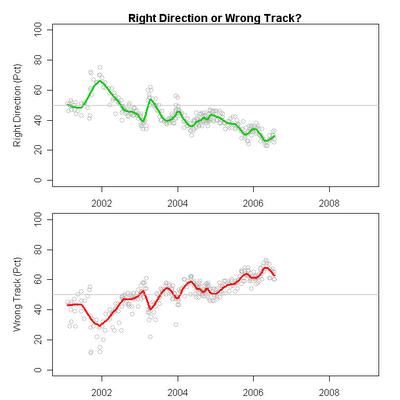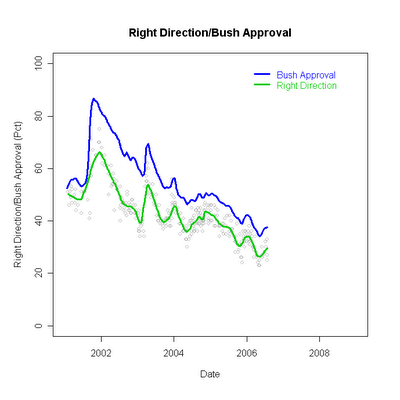
After presidential approval, no polling indicator seems to get more attention than the "right direction/wrong track" question. Many polls open the survey with this question and almost all include it in some form or another (though there are a variety of wordings.)
The AP/Ipsos version of the question is reasonably representative:
"Generally speaking, would you say things in this country are heading in the right direction, or are they off on the wrong track?"Gallup, Pew and Newsweek use a "satisfied/dissatisfied" variation:
"All in all, are you satisfied or dissatisfied with the way things are going in this country today?"(There is variation within each of these two types, but these are representative of the major differences.)
The question is, presumably, intended to guage optimism or disappointment with the state of the nation in some general sense. No mention of political leaders, parties or events is used to structure the question. Over the past five and a half years, the mood of the country has been decidedly down-hill by this measure. The "right direction" option got a huge boost from 9/11 but fell below 50% by mid-2002 and has rallied over 50% only once, at the start of the Iraq war. Since early 2004 over 50% of Americans have said we are "off on the wrong track." There was some improvement in right direction during the 2004 election campaign, but not enough to get back to a positive net balance of right direction over wrong track. Since 2005, the indicator has trended to a decidedly worse state. In 2004 it averaged 41% right, 53% wrong. In 2005 that moved to 36% right and 58% wrong. So far in 2006 the averages are 30% right, 64% wrong. If this trend predicted votes, someone would be in trouble.
But it isn't clear that the right direction/wrong track is actually a very good harbinger of political change. In 2004, for example, President Bush won reelection while averaging a net -12.4% on this measure. By comparison, Al Gore managed to only just break even in the popular vote while enjoying an amazing +19.2% net reading. Republicans did well in in the 2002 midterm despite a net of only +0.7% in the second half of the year. So as a predictor of electoral shifts, the right direction/wrong track variable doesn't have an obviously strong track record.
During the Bush administration, the right direction response has closely mirrored President Bush's approval rating. The figure below shows the parallel rise and fall of both approval and right direction. Approval has averaged 11.7 points higher than right direction, but the two trends are near mirrors of each other-- the correlation between estimated trends is +.94. That doesn't leave much room for independent variation.

Because of this very high correlation, we can't gain very much from using the right direction/wrong track measure rather than the more obvious presidential approval. While there are clearly some people who approve of the president's handling of his job while still thinking the country is off on the wrong track, the two series are essentially carrying the same information. If we were to predict midterm vote with the right direction measure, we wouldn't do any better than if we used presidential approval instead. Likewise, there is no evidence here that one of these indicators shifts before the other. If one did, that would be a potential leading indicator of things to come. Alas, they seem to both respond to the same things and at the same time. What could that be? I'd bet presidential leadership and the odd random event.
The interest in the right direction/wrong track indicator seems unlikely to go away. Pollsters and their clients seem fascinated with the measure. Newspapers and other media report the results. But what the answers actually mean, other than reflecting good and bad presidential performance and conditions in the country is a bit of a mystery. My preference is for items that measure reactions to "real" objects, such as the president or congress or your senator or a particular issue. While this item has its defenders, the evidence in the Bush administration at least is that it isn't really distinct from presidential approval.
Click here to go to Table of Contents
P.S. I've been planning the "Basic indicators" section for a while. There will be several, and they will be updated in place. So come back to check on future trends of this and other favorites.
My thanks to "Anonymous" who posted a question about the right direction/wrong track question today. Unfortunately, I can't seem to find that comment on any of the posts. I don't know where it was posted, and Blogger doesn't seem anxious to report which item a comment is attached to. So my thanks for the nudge to finally get something up about this. I'm sorry to not be able to reply to the comment (wherever it may be) but I hope this answers the question.